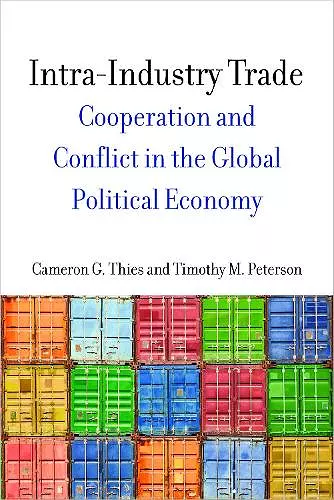Intra-Industry Trade
Cooperation and Conflict in the Global Political Economy
Cameron Thies author Timothy M Peterson author
Format:Hardback
Publisher:Stanford University Press
Published:28th Oct '15
Currently unavailable, and unfortunately no date known when it will be back

Intra-Industry Trade calls for us to rethink what trade most often looks like and how it shapes global institutions, fostering peace among states. Cameron G. Thies and Timothy M. Peterson argue that our understanding of trade has not kept pace with its changing nature in the 21st century; existing models, rooted in Ricardo's theories, regard trade uniformly as taking place between entities and countries that offer different commodities and operate according to the logic of comparative advantage. Though this type of exchange does take place, intra-industry trade—international trade of the same or similar commodities, in which foreign and domestic brands compete—is increasingly prevalent. The authors argue that our current academic and policymaking focus on the total volume of trade, rather than its composition, is misplaced. Trade composition matters, not just because it gives us a fuller understanding of how trade works, but also because intra-industry trade increases the likelihood of positive institutional relations and cooperation between states. To illustrate their point, the authors examine the effects that intra-industry trade has on Preferential Trade Agreement formation, its tendency to lessen World Trade Organization disputes and militarized conflict, and its ability to pave the way for new and fortified alliances.
"In this essential book, Thies and Peterson carefully assess the consequences of the growth of intra-industry trade, which now accounts for the majority of total trade flows. Their brilliant analysis compels us to completely reconsider our understanding of international trade and its political effects."—Anna Lanoszka, University of Windsor
"Cameron Thies and Timothy Peterson convincingly make the case that trade remains important for international cooperation and conflict. Their study is the first to do full justice, both theoretically and empirically, to the increasing importance of intra-industry trade. Well-informed, cogently argued, and methodologically sophisticated, their book is bound to guide key debates in International Political Economy and International Relations."—Han Dorussen, University of Essex
"The nature of trade is changing. Cameron Thies and Timothy Peterson provide an admirable demonstration of how an expansion of intra-industry trade can be a powerful force for peace. Social scientists and policy makers will learn a great deal from reading this book."—Solomon W. Polachek, State University of New York at Binghamton
"The political implications of trade have been studied for centuries, and it is rare that a book comes along that is able to shed new light on such a well-covered topic. Thies and Peterson manage to do just that by focusing on the particular consequences of intraindustry trade on the phenomena of cooperation and conflict in world politics....[T]his is a book that balances empirical rigor with accessible arguments suitable for any student of political science or global studies....[T]he research here provides a roadmap for how to improve upon the way we study the complex but not incomprehensible link between trade and political outcomes such as conflict and cooperation."—Mark Crescenzi, International Studies Review
"A key contribution of the book is the recommendation of a new theory that suggests a clear, causal relationship between trade and international cooperation. Although economists have developed models and theories that explain the composition of trade, there has been little or no research on the impact of such composition on global politics....[T]he new findings concerning the composition of trade are worth reading."—Douglas Mugabe, Review of Regional Studies
ISBN: 9780804791335
Dimensions: unknown
Weight: 408g
208 pages